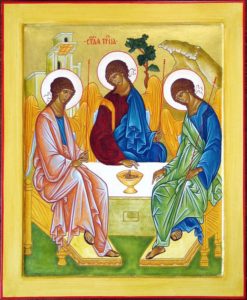Another good class yesterday, engaging and enlightening. Here are the notes that were the basis for our conversation; we thought again a little about what it is that makes it difficult for us to be hospitable.
I am grateful to a close friend for reminding me of the central theme of Hospitality on Homer’s Odysseus; maybe, just a little maybe, I will read it again… soon!
Trinity Church
Newport, RI
Hospitality
The Mark of Humanity & Divinity
#2 Hospitality of the Heart – Sunday March 12th 2017
Make room in your hearts for us. We have wronged no one, we have corrupted no one, we have taken advantage of no one. I do not say this to condemn you, for I said before that you are in our hearts, to die together and to live together. I am acting with great boldness toward you; I have great pride in you; I am filled with comfort. In all our affliction, I am overflowing with joy —2 Corinthians 7:2–4
Take care, brothers and sisters, that none of you may have an evil, unbelieving heart that turns away from the living God – Hebrews 3:12-19
“Do not mistake endurance for hospitality” – Anon
WELCOME – Old English wilcuma ‘a person whose coming is pleasing’, wilcumian (verb), from wil- ‘desire, pleasure’ + cuman ‘come’. The first element was later changed to wel- ‘well’, influenced by Old French bien venu or Old Norse velkominn.
Genesis 18
18 1-2 GOD appeared to Abraham at the Oaks of Mamre while he was sitting at the entrance of his tent. It was the hottest part of the day. He looked up and saw three men standing. He ran from his tent to greet them and bowed before them.
3-5 He said, “Master, if it please you, stop for a while with your servant. I’ll get some water so you can wash your feet. Rest under this tree. I’ll get some food to refresh you on your way, since your travels have brought you across my path.”
They said, “Certainly. Go ahead.”
6 Abraham hurried into the tent to Sarah. He said, “Hurry. Get three cups of our best flour; knead it and make bread.”
7-8 Then Abraham ran to the cattle pen and picked out a nice plump calf and gave it to the servant who lost no time getting it ready. Then he got curds and milk, brought them with the calf that had been roasted, set the meal before the men, and stood there under the tree while they ate.
9 The men said to him, “Where is Sarah your wife?”
Isaiah 58:10-12Common English Bible (CEB)
10 if you open your heart to the hungry,
and provide abundantly for those who are afflicted,
your light will shine in the darkness,
and your gloom will be like the noon.
11 The LORD will guide you continually
and provide for you, even in parched places.
He will rescue your bones.
You will be like a watered garden,
like a spring of water that won’t run dry.
12 They will rebuild ancient ruins on your account;
the foundations of generations past you will restore.
You will be called Mender of Broken Walls,
Restorer of Livable Streets.
21 You shall not wrong or oppress a resident alien, for you were aliens in the land of Egypt. 22 You shall not abuse any widow or orphan. 23 If you do abuse them, when they cry out to me, I will surely heed their cry; 24 my wrath will burn, and I will kill you with the sword, and your wives shall become widows and your children orphans – Exodus 22
You shall then recite as follows before your Eternal God: “My father was a fugitive Aramean. He went down to Egypt with meager numbers and sojourned there; but there he became a great and very populous nation. The Egyptians dealt harshly with us and oppressed us; they imposed heavy labor upon us. We cried to the Eternal, the God of our ancestors, and the Eternal heard our plea and saw our plight, our misery, and our oppression. The Eternal freed us from Egypt by a might hand, by an outstretched arm and awesome power, and by signs and portents, bringing us to this place and giving us this land, a land flowing with milk and honey. (Deuteronomy 26:5-8)
Eight Teachings from the Torah on Immigrants
1. You shall not wrong nor oppress a stranger, for you were strangers in the land of Egypt. (Exodus 22:20)
2. You shall not oppress a stranger, for you know the feelings of the stranger, having yourselves been strangers in the land of Egypt. (Exodus 23:9)
3. You shall not pick your vineyard bare, or gather the fallen fruit of your vineyard; you shall leave them for the poor and the stranger; I the Eternal am your God. (Leviticus 19:10)
4. When strangers reside with you in your land, you shall not wrong them. The strangers who reside with you shall be to you as your citizens; you shall love each one as yourself, for you were strangers in the land of Egypt; I the Eternal am your God. (Leviticus 19:33-34)
5. You too must befriend (love) the stranger, for you were strangers in the land of Egypt. (Deuteronomy 10:19)
6. You shall not abhor an Edomite, for such is your kin. You shall not abhor an Egyptian, for you were a stranger in that land. (Deuteronomy 23:8)
7. You shall not subvert the rights of the stranger or the fatherless; you shall not take a widow’s garment in pawn. Remember that you were a slave in Egypt and that your Eternal God redeemed you there; therefore do I enjoin you to observe this commandment. (Deuteronomy 24:17-18)
8. Cursed be the one who subverts the rights of the stranger, the fatherless, and the widow. And all the people shall say, Amen. (Deuteronomy 27:19)
Hospitality of Heart
Hospitality is much more than a simple welcome or an offer of food or drink. Hospitality is an attitude of heart that opens us to others and receives them on their own terms. Henri Nouwen speaks of hospitality as a move from hostility to friendship:
“Hospitality, therefore, means primarily the creation of a free space where the stranger can enter and become a friend instead of an enemy. Hospitality is not to change people, but to offer them space where change can take place. . . Hospitality is not a subtle invitation to adopt the lifestyle of the host, but the gift of a chance for the guest to find his own.”
The challenge is to offer friendship without binding the guest and freedom without leaving them alone. “The real host is the one who offers that space where we do not have to be afraid and where we can listen to our own inner voices and find our own personal way of being human.” It means providing space where new life can be found and everyone’s gifts can flourish. To do so, we have to be at home ourselves and be willing to lay down our fears of change. We have to be willing to be vulnerable and open to new ways of doing things. We have to let go of our narcissism and exaggerated individualism.
Hospitality means openness to what guests and strangers bring to us. We receive a revelation from the guest which can change us and enrich our lives and open us to new possibilities and ways of thinking and living.
Hospitality implies attentiveness to the other and to the needs of others, even anticipating their needs. As Gula explains, “The key to hospitality is ‘paying attention.’ . . . When we pay attention, we divest ourselves of self-preoccupation. To be hospitable we have to get out of ourselves and become interested in the other.”
Often our lack of hospitality is simply the failure to notice and acknowledge others and their needs—the needs of the larger world and the needs of those closest to us. Jesus models that attentiveness. He noticed the sick, the excluded, the hungry, those that others passed by. God continues to be attentive. As we contemplate the ministry of Jesus, we are called to heighten our awareness of others so that we can carry on the ministry of Jesus.
—Excerpted from Putting on the Heart of Christ by Gerald M. Fagin, SJ
Hospitality and Homer’s Odyssey
Thinking of hospitality as a major theme in a literary work may seem odd to modern readers. In Homer’s world, however, hospitality is essential. Fagles and Knox (p. 45) refer to hospitality as a dominant part of “the only code of moral conduct that obtains in the insecure world of The Odyssey.”
Arriving strangers may be dangerous or harmless, and residents are wise to be prepared for trouble. Often, however, strangers are but wayfarers, probably in need of at least some kind of help. Similarly, the residents themselves — or their friends or kin — may, at some time, be wayfarers. Civilized people, therefore, make an investment in hospitality to demonstrate their quality as human beings and in hopes that their own people will be treated well when they travel. Furthermore, communications are very primitive in Homer’s world, and strangers bring and receive news. It was through visitors that the Homeric Greeks learned about and kept abreast of what was happening in the world beyond their local areas.
Hospitality, or the lack of it, affects Odysseus throughout the epic, and the reader can judge civility by the degree of hospitality offered. Odysseus’ own home has been taken over by a horde of suitors who crudely take advantage of Ithaca’s long-standing tradition of hospitality. Telemachus and Penelope lack the strength to evict them, nor can they hope for much help from the community because the suitors represent some of the strongest families in the area. In his wanderings, Odysseus receives impressive help from the Phaeacians and, initially, from Aeolus. Circe is of great assistance after Odysseus conquers her, and the Lotus-eaters might be a little too helpful. On the other hand, the Sirens are sweet-sounding hosts of death, and Cyclops (Polyphemus) makes no pretense toward hospitality. In fact, Polyphemus scoffs at the concept and the gods that support it.
Zeus himself, king of the gods, is known as the greatest advocate of hospitality and the suppliants who request it; yet even he allows the sea god Poseidon to punish the Phaeacians for their generous tradition of returning wayfarers to their homelands.


